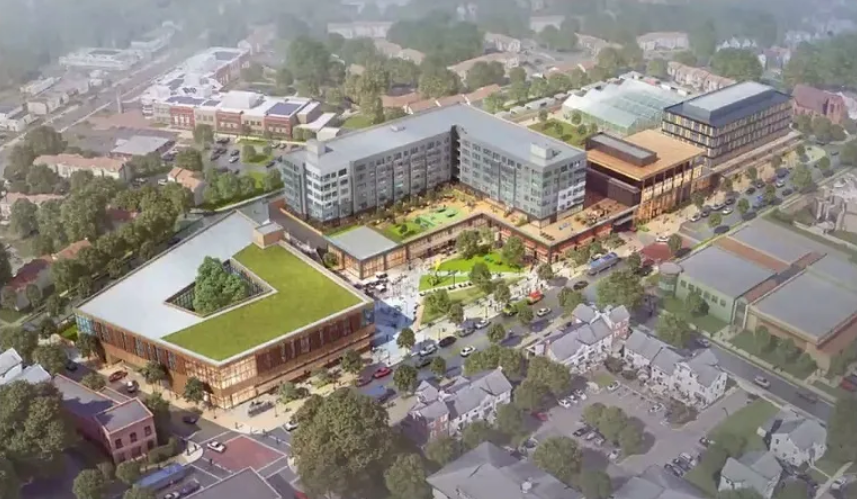
Dixwell Plaza’s redevelopers won their final needed city approval to undertake an estimated $185 million overhaul of the fraying mid-century shopping strip — and turn it into a bustling mix of apartments, stores, and cultural venues in the heart of New Haven’s historic Black neighborhood.
That happened at Wednesday night’s latest regular monthly meeting of the City Plan Commission. The virtual meeting took place online via Zoom.
The local land-commissioners voted overwhelmingly in support of two special permits and one site plan associated with ConnCORP’s planned rebuild of the 7.66-acre Dixwell Avenue block between Webster Street and Charles Street, across the street from the new Q House and adjacent to the Florence Virtue Homes.
ConnCORP is a for-profit subsidiary of the Science Park-based job training nonprofit Connecticut Center for Arts and Technology (ConnCAT).
Their local redevelopment team has spent the past few years buying up the condos in the existing Dixwell Plaza complex, hosting community meetings about the project, and working with the city to tee up the plans that won final approval Wednesday night.
And what do those now-approved plans include?
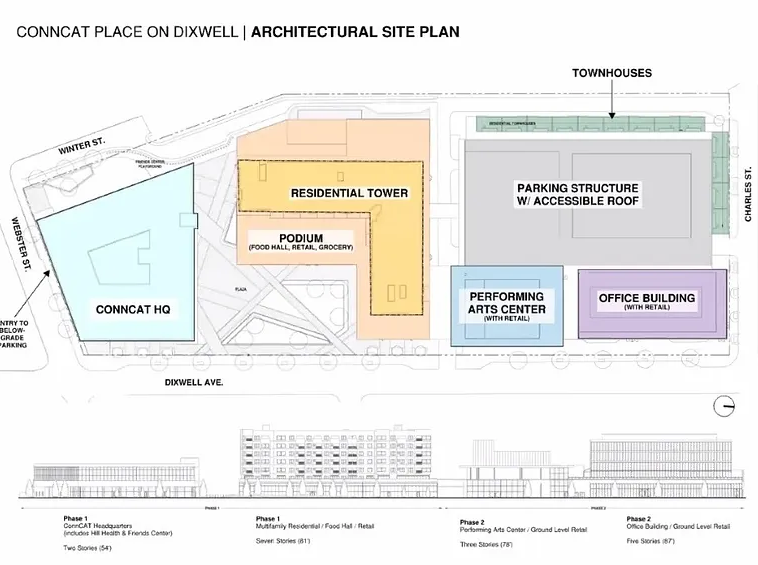
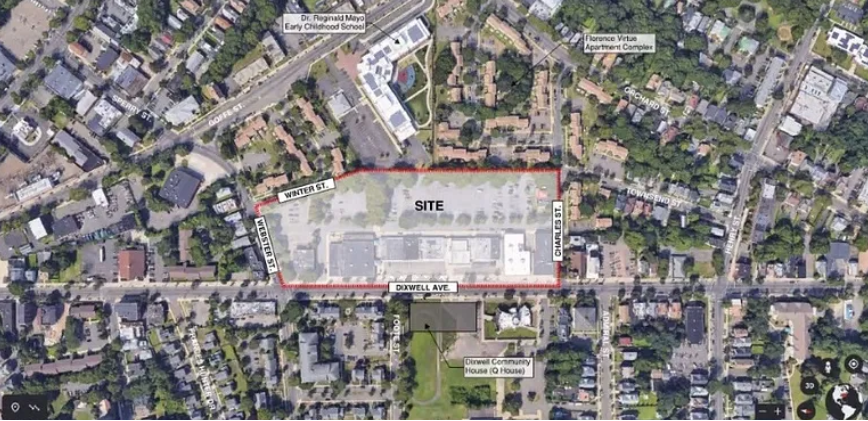
Knocking down Dixwell Plaza’s existing commercial condos and the old Elks Club at 87 Webster St., and building in their stead:
• A new seven-story, 184-unit apartment building and 259-space underground parking garage. A Board of Alders-approved Development and Land Disposition Agreement (DLDA) requires that at least 20 percent of those apartments be set aside at below-market rents.
• That same building will also have a first-story “podium” consisting of an 18,460 square-foot food hall, a 20,000 square-foot grocery store, and 5,600 square feet of retail space facing Dixwell Avenue.
• A separate new two-story office building that will hold ConnCAT’s headquarters, a Cornell Scott Hill Health Center healthcare clinic, and a daycare center called the Friends Center.
• A public plaza facing Dixwell Avenue.
• And a temporary 237-space surface parking lot on the northern half of the site.
And that’s all just part of Phase 1.
The redevelopment’s Phase 2, which City Plan Commissioners also OK’d as part of Wednesday night’s approvals, is slated to include knocking down the Charles Street police substation building and the former Hill Health clinic at that corner of Dixwell, and converting those spaces along with the temporary surface parking lot into:
• A new two-story, 350-seat performing arts center with ground-floor retail space.
• A new five-story office building with ground-floor retail space.
• 13 new three-bedroom townhouse units.
• And a new above-ground 340-space parking garage.
Local attorney Carolyn Kone and developer Yves Joseph said that Phase 1 demolition and construction are slated to begin in the fall of 2022, and conclude two years after that. Phase 2 demolition and construction will begin as soon as Phase 1 is complete, and should also take two years to complete.
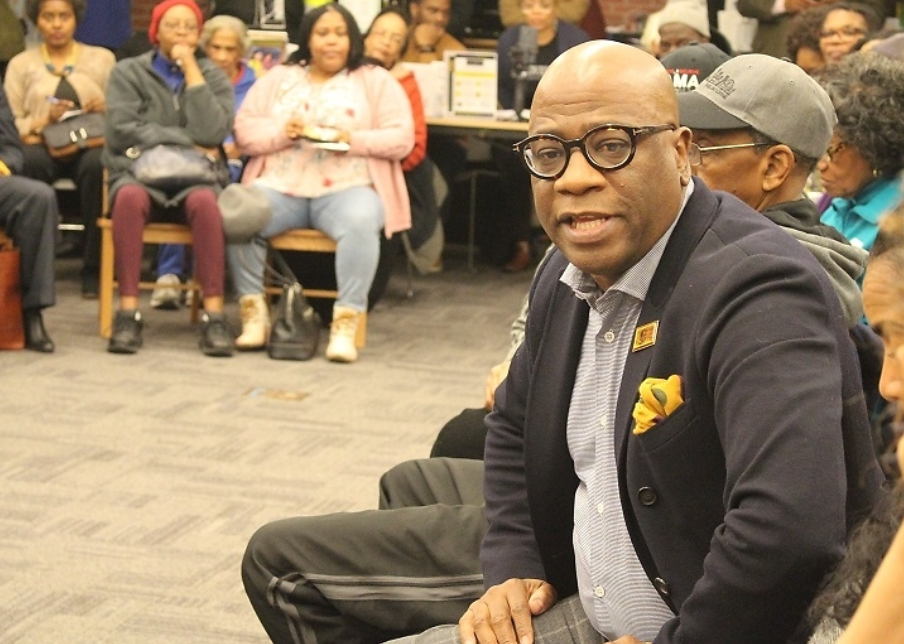
ConnCORP and ConnCAT strive to bring “beauty, dignity, vitality, and new possibilities to New Haven’s most impoverished communities,” ConnCORP Executive Board Chair Carlton Highsmith told the commissioners Wednesday night.
ConnCORP CEO Erik Clemons agreed. “The thrust of our work is to aggressively address poverty as well as inspire wealth generation and wealth creation for existing Dixwell residents,” he said. “We believe in beauty. We believe in dignity and vitality.”
Clemons said that the two-phase redevelopment should bring 600 permanent jobs and 400 construction jobs to the Dixwell neighborhood, and it should generate around $1 billion in economic activity seven years after its creation.
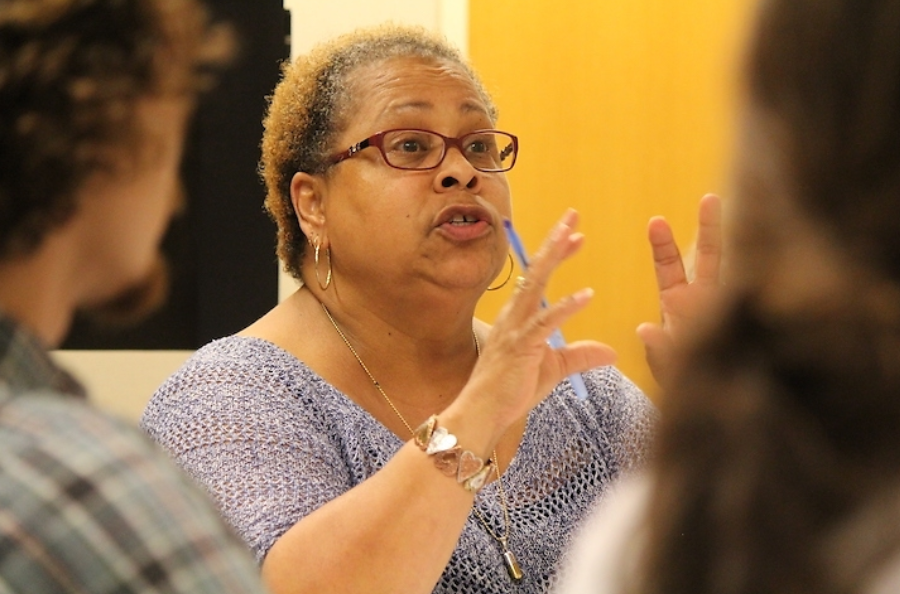
“This is something that we in the community will be able to look at and say, ‘We did this,’ ” Commission Chair Leslie Radcliffe said with pride before before leading her colleagues votes of support for the special permits and the site plan.
(While the special permit votes were unanimous, the site plan vote was 4−0−1, with Commission Vice-Chair Ed Mattison abstaining out of concerns about the project’s financial viability. See more below.)
“The faces of this team mean a lot to this community,” Radcliffe added. “And the work that’s being presented to us is at a level, as far as professionalism and engagement with the community … I don’t think there has been a project that has come through New Haven that has engaged the community to the extent that this project.”
She listed each feature of the project — the hundreds of jobs, the new apartments and townhouses, the grocery store and food hall, the performing arts center — and paused at each point to emphasize just how transformative of an impact they will have as a whole on the Dixwell neighborhood.
“It’s good for the City of New Haven,” she said. “It’s good for the Dixwell community. It is putting a stamp on the Dixwell community. It is a part of the Dixwell community that is going to remain a part of the Dixwell community, but also show what it can be, what it will be.”
Parking? Traffic? Churches?
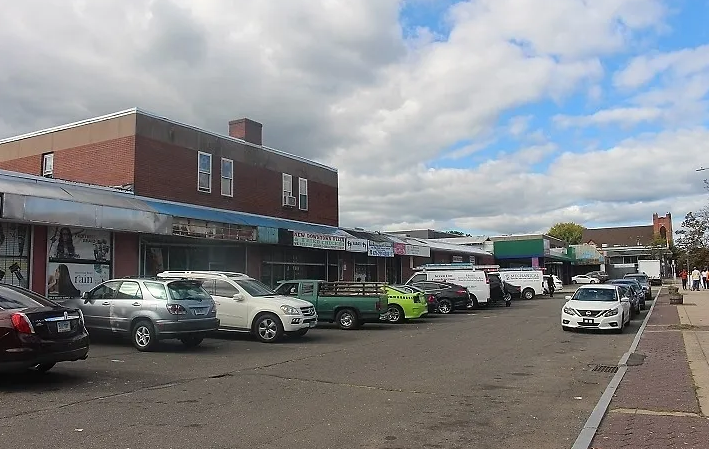
Roughly a dozen neighbors spoke up during the public hearing portion of the meeting. Nearly all praised the transformative potential of the project, even as many raised concerns about the potential traffic impact and the number of parking spaces being added to the site.
“We see this as a renaissance, an economic renaissance for our community,” said Clifton Graves, who serves as the moderator for the Dixwell Avenue United Church of Christ across the street from the proposed redevelopment. “It would be a shame if we don’t support this and not do something to continue to uplift and support our community.”
Edgewood resident Melissa Singleton described the project as “amazing” and thanked the developers for taking into consideration input they’d received from community members at several pre-pandemic meet-ups.
“We think that the Dixwell project is a very good idea for the neighborhood,” said Mt. Bethel Church trustee Rita Worthy, even though she is concerned about where church members will be able to park once the lot behind the former Elks Club building on Webster Street disappears.
“Dixwell Plaza is desperately in need of revitalization, and we appreciate ConnCORP and ConnCOT for taking on that project,” said Crystal Gooding. She directed her concerns at how this might affect already-backed-up traffic at Dixwell and Webster.
“My number one concern is parking for the church,” said Rock Tabernacle Church Pastor Willis Miller. “I think the project is a great idea … [but I still have] concerns about church parking and traffic and temporary parking while the Phase 1 demolition and construction is starting.”
Project engineer Katy Gagnon said that her firm conducted a traffic study and, after observing key intersections and crunching the numbers, determined that the area can absorb the increase in car traffic associated with this development without causing any serious delays.
And Clemons promised to work directly with all of the project’s church neighbors to iron out parking concerns as they crop up over the course of the development.
Financial Viability?
Several members of the public, as well as Commission Vice-Chair Mattison, raised concerns Wednesday night about the financial viability of this massive redevelopment.
“How are you going to sustain this?” Ashmun Street resident Carla Chappel asked about the proposed new performing arts center in particular.
ConnCAT Chief Investment Officer Anna Blanding laid out the finances of the project as they currently stand.
“As far as the financial viability, it’s something that has been very critical to us,” she said. “How do we deliver such an impressive amount of needs to the community” — from daycare to performing arts to workforce training to child mental healthcare — while recognizing that many of those services “don’t really generate cash returns?”
She said that ConnCORP is currently looking at a “capital stack” consisting of philanthropic dollars as well as more traditional financing.
Overall, she said, Phases 1 and 2 should cost a total of $185 million to complete.
She said the developers already have $50 million in philanthropic money committed, out of a goal of $55 million in philanthropic funds for the site.
She said they’re also looking to raise around $70 million of more traditional “senior debt” from banks, likely for the residential housing and office space components of the project.
She said the developers are looking into “new markets tax credits” and the possibility of Opportunity Zone funding, as well as potentially some public funds to help reach that $185 million number.
Blanding said construction will not begin “until we have our $185 million committed for the project.”
Mattison remain unconvinced.
“I am still not persuaded that it is financially viable,” Mattison said. What kind of income do the developers plan to generate from this project? How much are they going to have to borrow? How much are they going to have to pay in interest?
“I appreciate the enthusiasm and the thought that has gone into this,” he said. But “we should only go forward with it if it makes sense.” Because the last thing anyone would want to see is this project “get halfway through construction and find out you can’t go any further.”
Commissioner Ernest Pagan acknowledged Mattison’s concerns — and urged his colleagues to take a shot on this project.
“Looking at the drawings and looking at the conceptions for this neighborhood, this is beautiful. We can’t afford to just let this be and just not go after this opportunity. … This is Dixwell Avenue. This is historic.”
Westville Alder and City Plan member Adam Marchand also pointed out that the commission may not take financial viability into account as a criterion for consideration for the site plan review or special permit applications.
Financial viability is a concern that has to be taken up by the investors and the developers, he said. It can’t be considered by the commissioners.
“There’s going to be some growing pains with the project,” Marchand said. “It’s going to have an impact on the neighborhood. And it’s going to be mostly good. … If this works, there will be a heck of a lot more activity in that area, and that is mostly to the good.”




